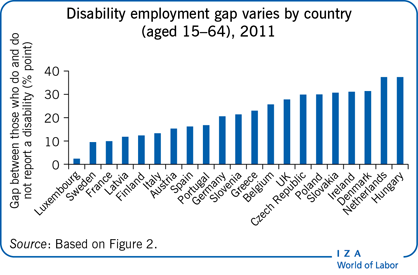Elevator pitch
In Europe, about one in eight people of working age report having a disability; that is, a long-term limiting health condition. Despite the introduction of a range of legislative and policy initiatives designed to eliminate discrimination and facilitate retention of and entry into work, disability is associated with substantial and enduring labor market disadvantage in many countries. Identifying the reasons for this is complex, but critical to determine effective policy solutions that reduce the extent, and social and economic costs, of disability-related disadvantage.

Key findings
Pros
There is a growing international body of evidence exploring the labor market experience of disabled individuals.
Parts of the raw gaps in labor market indicators by disability are explained by factors other than disability, including age and educational attainment.
There is growing use of experimental methods that attempt to identify labor market discrimination against disabled people in hiring.
The literature extends to consider evidence from developing countries.
Longitudinal evidence highlights that for many individuals who experience disability onset, it is not permanent.
Cons
There are limitations of using self-reported information on disability status from survey data, particularly in comparisons across countries.
There is consistent evidence that disability is associated with substantial labor market disadvantage, particularly in terms of employment.
Longitudinal analysis provides evidence of a likely causal influence of disability on labor market outcomes.
Disability may affect work-related productivity and preferences, making it particularly difficult to identify discrimination using survey data.
There is no consistent evidence that anti-discrimination legislation has improved the labor market outcomes of disabled individuals.